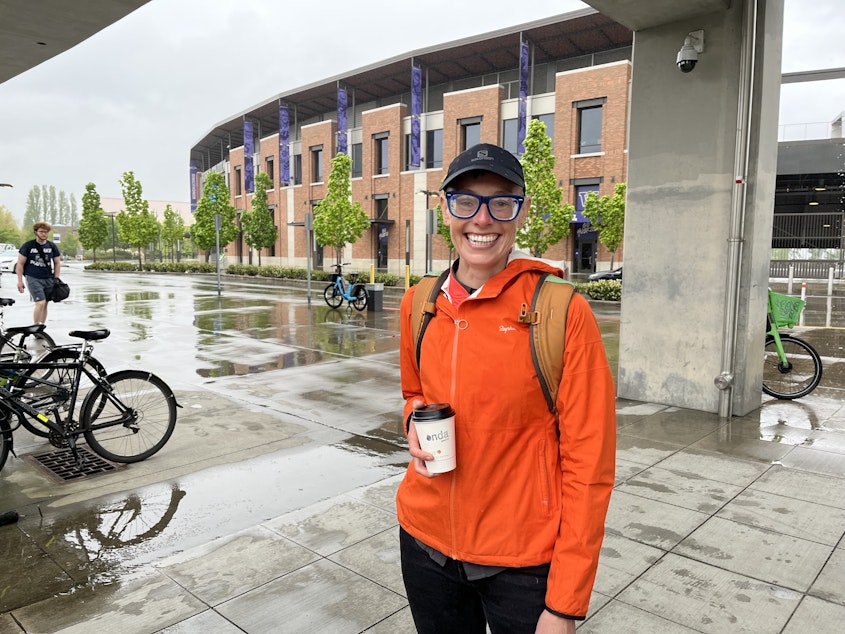This carless Seattleite has a vision for the city's 'holistic' transportation future

Without a car, people can find themselves walking on the shoulder of a road, steering their wheelchair out into traffic, and commuting longer and farther via transit.
Anna Zivarts wanted to highlight those experiences when it comes to transportation planning in a new book, titled "When Driving is Not an Option: Steering Away from Car Dependency."
Across Seattle, Zivarts can point to features that make travel easier and safer for people without a car – and places where they are sorely lacking.
RELATED: Seattle has a long road ahead to eliminate all traffic deaths by 2030
One of the better examples is the University of Washington light rail station, a hub for walking, biking ,and transit.
"In talking to folks who don't drive, living near light rail, that is sort of the dream, right?" Zivarts said. "Having this kind of access."
It does have its problems, though. Pedestrians must cross several lanes of traffic to reach their buses. And the cost of housing in some of these vibrant neighborhoods puts them out of reach for the people who most need that connectivity.
Sponsored
RELATED: How will your life change when Bellevue's light rail opens?
Meanwhile, other neighborhoods are more affordable but lack infrastructure for non-drivers. Zivarts said hundreds of housing units are about to come online farther south, at the intersection of Rainier Avenue South and I-90, where planning is underway for a new Judkins Park light rail station. But she said the area needs major safety upgrades for transit riders and pedestrians.
"Crossing Rainier and crossing the on-ramps, not very pleasant, super unsafe," she said. "Rather than this freeway-car funnel right there, how can this be a neighborhood?"
Through her work at Disability Rights Washington, Zivarts has tried to advocate for the estimated quarter of the population that doesn’t drive cars, due to age, income, disability, or other reasons.
RELATED: Is King County’s Flex commuter van a flop? We tested it out
Sponsored
As a teenager growing up near Olympia, a disorder affecting Zivarts' vision kept her from getting a driver's license. She was devastated.
"I didn't know anyone who was an adult and couldn't drive," she said. "I couldn't imagine a life for myself."
In the last few years, she’s helped launch a nationwide Week Without Driving and sought ways to give people with disabilities a stronger voice in mobility planning. She said the Seattle Transportation Plan approved by the city council last week shows this work is paying off. It contains a commitment — albeit an unfunded one — to new sidewalks.
RELATED: Patience and planning: The ups and downs of a week without driving in Seattle
"Seeing what's in the Seattle Transportation Plan, that give me hope that we can think about it more holistically," Zivarts said. "It's going to take a financial commitment to finish building a sidewalk network, but that's how we're going to make our city accessible."
Sponsored
Earlier this month Zivarts celebrated a new patch of sidewalk in North Seattle. The city funded it after her student intern made a video showing his dangerous commute from the bus stop on Lake City Way.
Another solution she promotes is low-tech and inexpensive: simply taking the time to meet your neighbors.
"The city of Seattle has a wonderful block party permit program," she said. "Neighborly relationships are important both for that social connection but also in emergency planning."
RELATED: Should vehicles be allowed through Pike Place Market?
She said it's vital for neighbors to know who lacks access to a car and to be in touch with one another during severe weather.
Sponsored
"When it's so easy to get in a car and go see your friends 45 minutes away, you don’t spend as much time with your neighbors," Zivarts argued.
Zivarts said she hopes her book will continue these conversations. It will be released May 9. It will also be the focus of a discussion at Town Hall Seattle on May 13. Zivarts will be joined by Barb Chamberlain, director of the Active Transportation Division of the Washington State Department of Transportation, and Tanisha Sepúlveda, a program coordinator for Empower Movement WA, a coalition of BIPOC and disabled mobility advocates.




